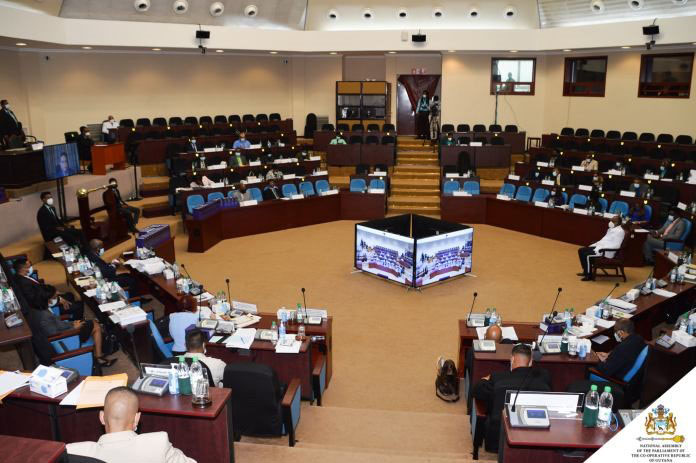The recent passage in the National Assembly of Guyana’s Natural Resource Fund Act, 2021, which now paves the way for the political administration to make withdrawals from funds accumulated so far from the sale of oil has been, unsurprisingly, swiftly followed by an announcement by Senior Minister in the Office of the President with responsibility for Finance, Dr Ashni Singh, that Guyana is likely to have to move in short order to access funds from that source to finance what is being termed as the pressing development needs of the country.
The immediate circumstances arising out of, first, the debate and afterwards the eventual passage of the Bill in the National Assembly, are likely to be a matter of much more immediate concern in a country in which openly expressed fears of partisan political control over the country’s oil wealth has been the subject of public discourse almost immediately after ‘first oil’ disclosure back in 2015. The uproarious scenes in the National Assembly that attended the December sitting of the National Assembly, and as has already been mentioned the government’s disclosure of its seemingly short term to access the funds for development purposes, are issues that may well occupy the public space, in one way or another, for some time.
While it was always anticipated that the less-than-robust state of the country’s economy, including its challenges in physical infrastructure was likely to see early official resort to the oil funds, that does not alter the likelihood that Dr Singh’s recent disclosure could trigger more public and political chatter over what remains – the presumed legislative safeguards notwithstanding – the vexed issue of the importance of protecting the returns from the oil sector from profligate spending, and more worryingly, questionable misdirection.
The matter of just how Guyana’s anticipated oil wealth is to be managed has been an issue even prior to ExxonMobil’s announced lifting of ‘first oil’ from the Liza field, located in Guyana’s offshore Stabroek Block back in December 2019. For much of 2020 and 2021, the subject of the methods that might be used for properly safeguarding the returns from the sector had been debated both inside and outside the country, the overarching concern reposing in stated public anxiety that whichever political party or coalition occupied office, opportunity for the seizing of unchecked political control over what could be future-transforming wealth for Guyana, be avoided. The discourse included opinions from external natural resource fund analysts on the subject as well as local perusal of some of the various options by countries for the creation and protection of natural resource funds.
In announcing government’s intention to make what appears to be relatively immediate-term withdrawals from the Fund to finance what he says are some of the country’s pressing development needs, Dr Singh said that this will be done through a transparent mechanism guided by parliamentary scrutiny. Among those needs listed are: responding to COVID-19, addressing COVID-related setbacks in the education sector, upgrading and expanding transport infrastructure in response to dilapidation and modernisation pressures, building climate resilience to prevent disasters like the May/June 2021 flooding, promoting the development of industries through which Guyanese may build generational wealth, and reducing the cost of living.
Old habits die hard, however, and more than a handful of commentators not known to have partisan political axes to grind have expressed concern over what one described as the “wooliness” of some of the justifications tendered for accessing the Natural Resource Fund (NRF). On the other hand, some of the commentators on what is now the prerogative of the government to access the NRF are indeed partisan in their outlook, a circumstance that raises the likelihood of robust debate and political rumblings both inside and outside the National Assembly in the period ahead.
In the course of the parliamentary debate that preceded the passage of the legislation, Dr Singh had asserted that the legislation was going to “facilitate an accelerated development agenda,” including “investment in critical infrastructure” and “critical social services,” and will, as well, “improve people’s lives.” At the level of political engagement, however, such generalised pronouncements will have to be attended by clarity and detail if the overall process is not to be attended by frequent interludes of controversy, as does an earlier statement reportedly issued by the Ministry of Finance justifying the rules governing withdrawals from the Natural Resource Fund on the grounds of “immediate need for sound and transformative investments in order to advantageously position our economy to ensure that the benefits from the oil and gas sector redound towards the wider economy and all Guyanese.” This pronouncement, too, is characterised by a certain lack of detail and clarity that will inevitably bring it under a fair measure of public and political scrutiny.









